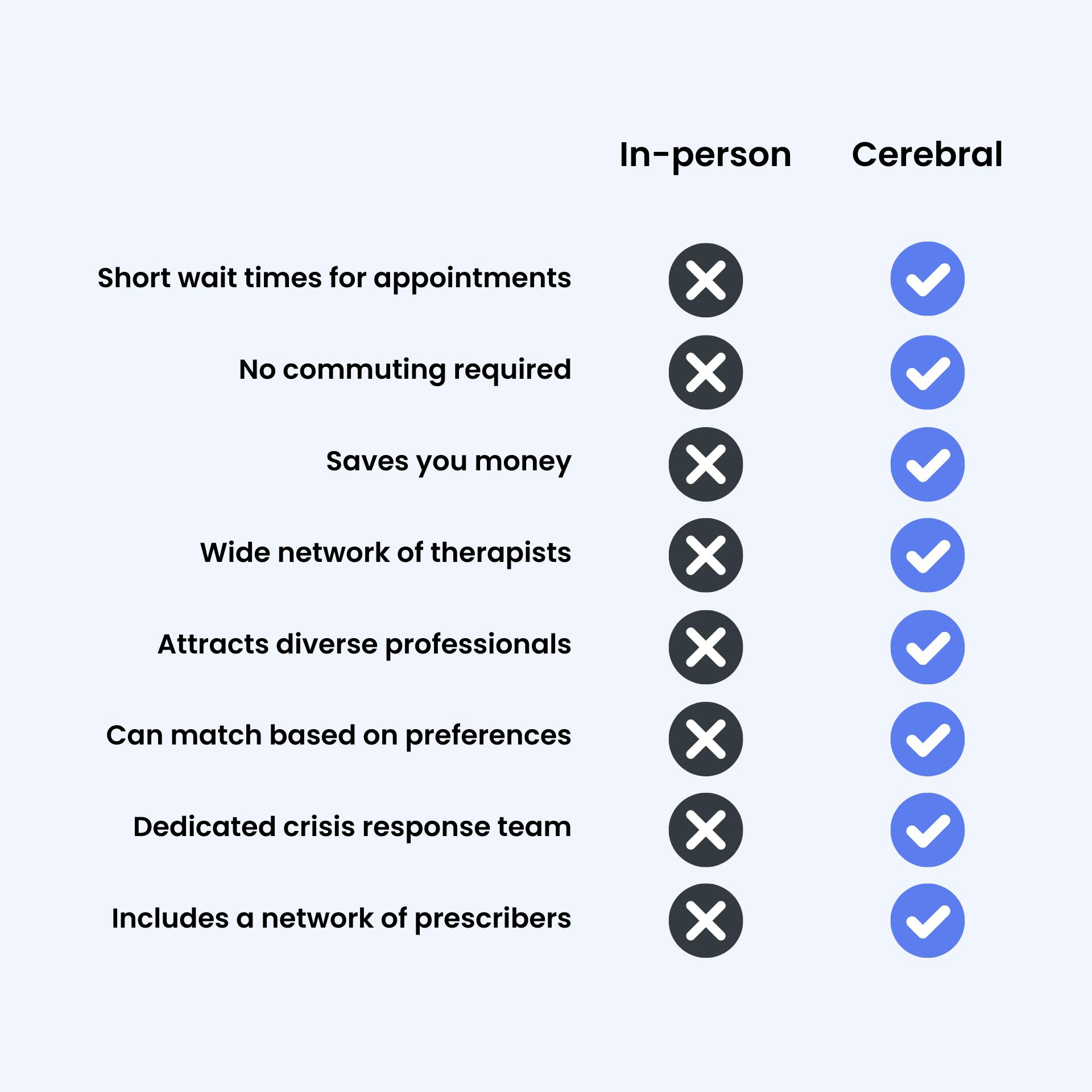A Guide to Finding A Therapist For Bipolar Disorder

Finding the right bipolar disorder treatment path for you can be empowering. This guide can help you simplify the process of finding a therapist.
In it, you’ll learn about the therapy types, the advantages of therapy for bipolar disorder treatment, how in-person and online therapy compare, and advice on how to select the best therapist for you.
The types of therapy used for bipolar disorder
Often used in conjunction with medication, therapy can play a supporting role in the management of bipolar symptoms by helping individuals explore their experiences, thoughts, feelings, and behaviors under the guidance of a trained professional.
Since the disorder affects each person differently, various therapeutic approaches allow for personalized care plans that address specific challenges, triggers, and symptoms.
The goal of therapy is not only to manage bipolar symptoms but also to enhance overall quality of life, empower individuals with coping strategies, and support long-term stability.
Cognitive behavioral therapy (CBT)
CBT is a structured form of talk therapy that has been shown to be effective in helping individuals with bipolar disorder to better manage their symptoms by examining and changing thought patterns, emotions, and behaviors.
It typically involves identifying negative thought processes and learning how to replace them with more positive ones. CBT may also involve developing coping strategies and stress management techniques.
Free resource: CBT Thought Record Exercise Worksheet
Dialectical behavioral therapy (DBT)
Often used in conjunction with other therapies, DBT is a more focused offshoot of CBT that concentrates on managing the intense emotions and mood swings associated with bipolar disorder. It achieves this by combining standard cognitive-behavioral techniques with core concepts of distress tolerance, mindfulness, emotional regulation, and interpersonal effectiveness.
Learn more: DBT Distress Tolerance Skills for Emotional Crisis
Family-focused therapy (FFT)
FFT is not just about the individual; it involves the whole family. It educates, supports, and teaches family members effective and constructive ways to interact with the individual with bipolar disorder to create a nurturing and empathetic environment.
This type of therapy may also involve addressing family dynamics and communication patterns to improve relationships and promote healing.
Interpersonal and social rhythm therapy (IPSRT)
IPSRT is an evidence-based approach developed specifically for the treatment of bipolar disorder. Its focus is on balancing social routines and mood symptoms while also developing strategies to improve social skills and stabilize mood.
This therapy could be especially helpful for those seeking to consistently maintain daily routines and manage the disruptions in social relationships that can come with bipolar disorder.
How therapy can help those with bipolar
Why should you choose therapy? Here's the rundown on some of its benefits:
- Symptom reduction: Therapies like CBT and DBT are shown to reduce the frequency, duration, and severity of bipolar symptoms.
- Beyond medication: While medication is a standard treatment for bipolar disorder, therapy offers an additional layer of support.
- Life skills: Therapy can provide individuals with the tools they need to manage their thoughts, emotions, and relationships, which are especially crucial for those with bipolar disorder.
- Prevention of relapse: Some types of therapy, like IPSRT, help individuals regulate their social rhythms, which can lead to a more stable life and, in turn, reduce the risk of relapse.
Incorporating therapy could enhance your overall treatment plan for bipolar disorder.

How therapy complements bipolar meds
Medication is a fundamental component of bipolar disorder treatment, vital for stabilizing moods and controlling symptoms. However, medication alone may not address all the complexities of the condition.
This is where therapy comes into play, serving as a complementary approach. By participating in therapy, individuals not only work toward managing their symptoms but also develop crucial life skills and coping strategies. These skills help address daily challenges and reduce the impact of stressors that could trigger episodes.
Medication brings chemical imbalances under control, laying a foundation for emotional and psychological stability. Meanwhile, therapeutic interventions build on this stability, focusing on the behavioral, cognitive, and emotional aspects of bipolar disorder.
This integrated approach can empower you to take control of the entirety of your experience with bipolar disorder, paving the way for a more balanced and fulfilling life.
In-person vs. online therapy
The traditional in-person therapy model has been a go-to for mental healthcare, but online therapy is quickly becoming very popular. Let’s compare the two.

In-person therapy is a traditional approach that allows for improved body language reading and environment control but comes at the cost of being more expensive and less convenient.
Online therapy offers accessibility and affordability while still implementing proven therapeutic modalities. Without all the overhead that comes with running an office, online mental health providers like Cerebral can pass along savings to clients. Online therapy can also save you time because there aren’t as many scheduling limitations — plus, there’s no need to commute!
How to find a therapist
Selecting a therapist for your bipolar disorder care will take some research. Here are some avenues to explore:
- Online resources: Services like Psychology Today's directory or Cerebral’s network of online therapists can offer detailed profiles.
- Get a referral: Your primary care physician or psychiatrist can usually provide a list of recommended therapists.
- Friends and family: Reach out to friends and family who have positive experiences with therapy, especially if they have the same diagnosis.
- Check patient organizations: Organizations like the National Alliance on Mental Illness (NAMI) can be excellent resources for finding local support and therapy options.
- Community centers: Local mental health centers often have a network of resources and professionals.
Exploring various options and communicating openly with potential therapists will help you establish a therapeutic relationship that feels like the right match for you. A good fit can make all the difference in your therapy experience and overall treatment success.
Things to look for in a therapist
Once you have a list of potential therapists, how do you narrow down your options? Look for the following:
- Affiliations: Is the therapist part of any recognized mental health organizations or networks?
- Specialties: A therapist with a specific focus on bipolar disorder will likely have more experience treating it.
- Reviews and ratings: While not definitive, online reviews can provide insights into others’ experiences.
- Initial consultation: Meeting a therapist for a session can give you a feel for how you might benefit from their approach.
When searching for quality care from a credentialed therapist, prioritize experience with bipolar disorder, good communication skills, and a therapeutic practice that resonates with you.
What to ask a potential therapist
Being prepared with the right questions helps clarify the process. Be sure to ask:
- Are they accepting new patients?
- Do they take your insurance?
- Can they coordinate with your doctor or psychiatrist?
- What’s their background and training in bipolar disorder like?
You’ll also want to know what a typical therapy session looks like and how they measure progress toward your goals and motivations for going to therapy.
How to know if a therapist is a good fit for you
It's important to recognize when you've found a good relationship with a therapist so you can keep building on the work you do together. Signs that you're on the right track include:
- They’re responsive to your needs. A good therapist will demonstrate having heard and understood you by responding to your concerns and listening to you.
- They foster a sense of trust and safety. You’ll need to feel comfortable sharing many things with them, so you should feel that they’ve created a safe, judgment-free environment where you can be open and work through issues and concerns.
- You see progress. After an appropriate number of sessions, which varies from person to person, you should begin to notice improvement and benefits from your sessions, tailored to your personal timeline and needs.
Identifying these positive signs can help you feel assured in your choice of therapist, fostering a rewarding and supportive therapeutic relationship.
Why Cerebral might be a good fit for you
If you’re looking for convenience, flexibility, and affordability while still getting access to top-rated licensed therapists, Cerebral could be the right choice for you.
We’re committed to helping you find the best fit for you. With Cerebral, you’ll have access to a diverse group of mental health care professionals, and we take your preferences into account.
Not only can we match you with a therapist who has experience with bipolar disorder, but preferences around an ethnic background, age range, LGBTQIA+ experience, and gender can also be factored in. Plus, you can switch therapists for any reason, at any time.
We offer online therapy sessions at times that suit you best — during the day, at night, or over the weekend — allowing you to focus on your mental health without impacting your day-to-day responsibilities. When mood episodes can already cause interruptions in one’s daily life, this flexibility can be an advantage for bipolar individuals.
The ability to join sessions from the privacy and comfort of your own home can also be a significant benefit. It’s not uncommon to feel unmotivated during depressive episodes, and the effort, stress, and time it takes to travel to a therapist’s office could be a barrier during those periods.
With Cerebral, you can engage in meaningful therapy sessions wherever you are most comfortable. Being in a familiar private space could also help you feel freer to open up and discuss your feelings from the start.
Additionally, we have a large network of top-tier licensed prescribers, allowing you to also manage your bipolar medication online from one central place under one affordable subscription with free expedited shipping.
Want to give Cerebral a try? Schedule your first session today.
Images by freepik and freepik on Freepik.
The information in this blog is provided as a general educational resource only, and is not to be used or relied on for any diagnostic or treatment purpose. This information should not be used as a substitute for professional diagnosis and treatment and does not create any patient-physician relationship between you and Cerebral. Please consult your health care provider before making any health care decisions or to get guidance about a specific medical condition.

How to Support a Loved One with Bipolar Disorder

Bipolar vs. BPD: How To Tell The Difference

9 Common Triggers for Bipolar Episodes

Call 911 if you’re having a
mental health emergency
Text Home to 741-741 if you're in emotional
distress and need immediate support
Call or text 988 Suicide &
Crisis Lifeline. Chat service
is available at 988lifeline.org.